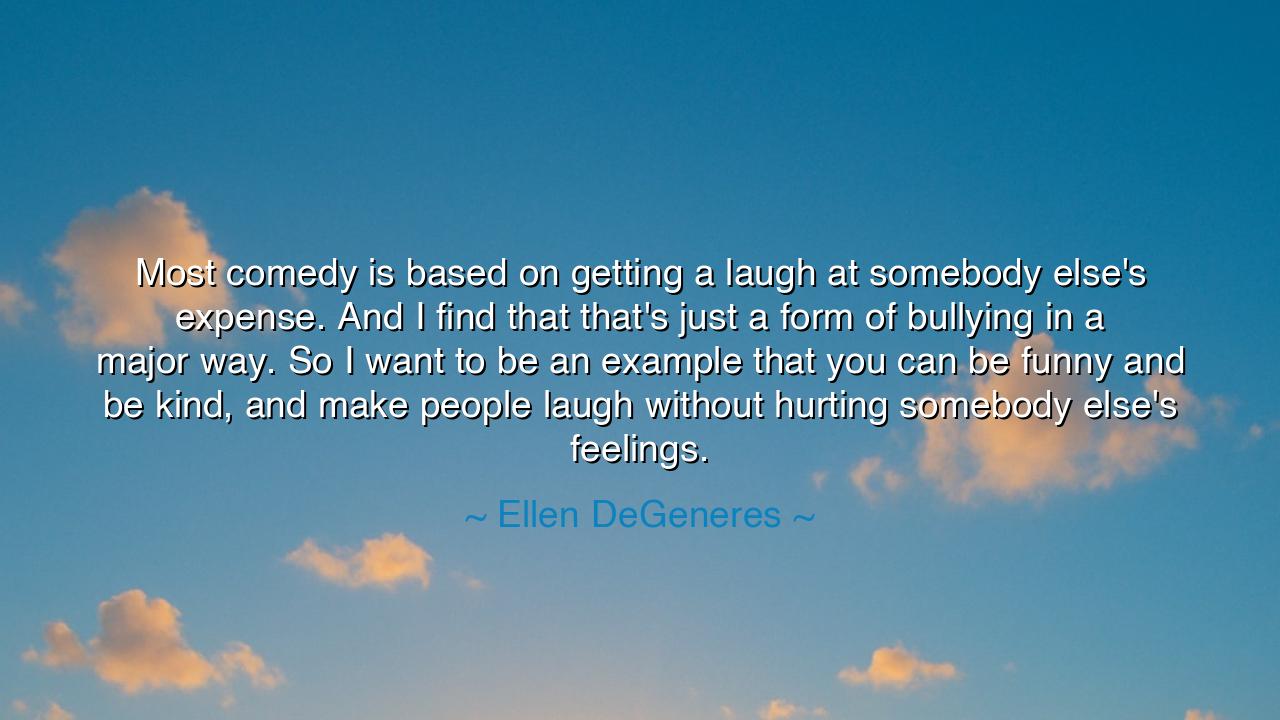
Most comedy is based on getting a laugh at somebody else's
Most comedy is based on getting a laugh at somebody else's expense. And I find that that's just a form of bullying in a major way. So I want to be an example that you can be funny and be kind, and make people laugh without hurting somebody else's feelings.






The modern philosopher of laughter, Ellen DeGeneres, once said: “Most comedy is based on getting a laugh at somebody else's expense. And I find that that's just a form of bullying in a major way. So I want to be an example that you can be funny and be kind, and make people laugh without hurting somebody else's feelings.” Her words, spoken softly but with conviction, hold the force of ancient wisdom — the call to elevate humor from cruelty to compassion, from mockery to mercy. For in every age, humanity has struggled to balance laughter and love, and Ellen’s insight reminds us that true humor is not born of harm, but of understanding.
To laugh is human, but to make others laugh without injury — that is divine. Ellen speaks of the kind of humor that heals rather than wounds, the kind that unites rather than divides. In a world quick to turn jest into judgment, she recognizes the moral power of kindness. Comedy, she says, should not be a weapon but a bridge. When laughter cuts another down, it feeds pride and cruelty. But when laughter lifts us all, it becomes a light against despair. Thus, she teaches that compassionate comedy is not weakness — it is strength restrained, power tempered by empathy.
The ancients, too, knew the peril of laughter wielded without wisdom. The philosopher Plato, in his dialogues, warned of the dangers of mockery — for when laughter turns to scorn, it corrupts both the speaker and the listener. He taught that the soul must guard its mirth, lest it grow cruel. And yet, he also knew the power of laughter to awaken truth. In the marketplace of Athens, the playwright Aristophanes filled the stage with satire, but his greatest works aimed not to humiliate individuals, but to expose the folly of pride and politics. His humor, though sharp, was guided by purpose — the laughter of enlightenment, not of cruelty.
Ellen’s words arise from this same ancient current. She has lived in the spotlight, where the temptations of mockery are strongest, yet she chose the higher path — to find joy in connection, not ridicule. Her comedy springs not from dominance, but from vulnerability. She shows that laughter can be gentle and still powerful; it can be pure without being dull. Her philosophy echoes that of Buddha, who taught that right speech must be kind, true, and beneficial. A joke that harms, Ellen implies, is not truly funny, for it leaves behind a wound where there should have been warmth.
Consider the story of Abraham Lincoln, a man who wielded humor like a healer’s touch. In the darkest hours of the American Civil War, when anger and despair consumed his people, Lincoln used gentle wit to ease tension and reveal truth. He never mocked the suffering or humiliated the weak. Instead, his humor was self-deprecating and humane — laughter that reminded his listeners of their shared frailty. He once said, “I laugh because I must not cry.” This, too, is the spirit of Ellen’s wisdom: to use humor not as a shield for cruelty, but as a balm for pain.
When Ellen calls laughter at another’s expense “a form of bullying,” she exposes a truth that civilization too often forgets. Words have weight. A jest may seem light, but it can crush the spirit it touches. Every generation must learn anew that mockery breeds division, while empathy breeds harmony. The heart that laughs without cruelty becomes a light in the darkness, a reminder that joy and kindness need not be enemies. Kind humor is not less funny — it is more enduring. For mockery dies with the wound it inflicts, but kindness echoes through the years.
The lesson, then, is simple yet profound: let your laughter be guided by compassion. Before you joke, ask whether your words build or break. Seek humor that reveals shared humanity, not one that hides cruelty beneath cleverness. Be the kind of soul who can make others laugh and feel loved at once. For laughter that heals is the laughter of the wise, the laughter that uplifts the weary and brings light into shadowed hearts.
So, my child, remember Ellen DeGeneres’s gentle challenge. When you stand before others — whether on a stage, in a crowd, or in conversation — use your words to lift, not wound. Let your humor shine with kindness, your wit sparkle with empathy. For true comedy, like true wisdom, does not come from the mind alone but from the heart. In this way, you will not only make others laugh — you will make them feel seen, cherished, and whole. And that, as the ancients would say, is the highest form of laughter: the laughter of love.






AAdministratorAdministrator
Welcome, honored guests. Please leave a comment, we will respond soon